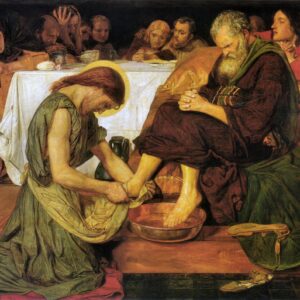 The author Robert Greenleaf coined the term “servant leadership.” It is a notion which appears not only in the New Testament, but also in the lives of many great leaders and many holy people over the centuries. The story of our Church is the story of thousands of men and women who learned to serve and, by virtue of their service, were able to lead others to Christ.
The author Robert Greenleaf coined the term “servant leadership.” It is a notion which appears not only in the New Testament, but also in the lives of many great leaders and many holy people over the centuries. The story of our Church is the story of thousands of men and women who learned to serve and, by virtue of their service, were able to lead others to Christ.
Mother Teresa of Calcutta, considered one of the twentieth century’s greatest humanitarians, is also one of the best examples of what “servant leadership” is all about. “Not all of us can do great things,” she said, “but we can do small things with great love.” She did both great and small things throughout her life, but did them all with great love. In this, she truly embodied “servant leadership.”
Each day, we also face opportunities to exercise “servant leadership.” It may be a casual encounter on our way to the store or to church or it may be more intentional when we decide to be part of a parish ministry dedicated to serving our children or the poor or the hungry. The “servant leader” places others before him or herself and acts accordingly, helping change the world (little by little) for good.
Modern American culture tends to create consumers of religion: we love our many devotions, we are faithful to our assigned pew, we like to be part of the “in” group and not outsiders. But “serving” means commitment; it means forgetting “our” things and “our” selfish concerns.
This Sunday’s Gospel (Mark 10, 35-45) is the story of the brothers James and John, the sons of Zebedee. They come to Jesus with an audacious request: to have the places of highest honor in the Kingdom. They want to reach the top of the ladder, skipping the lower steps. They want Easter while ignoring Good Friday. At this point in their lives, they are far from “servant leadership!” Let’s remember, though, that to be ambitious is not evil, yet selfish ambition is always wrong. James and John were asking selfishly. Martin Luther King, Jr. preached one of his most memorable sermons about today’s Gospel. He titled it: “The Drum Major Instinct.” He defined it this way: “A desire to be out in front, a desire to lead the parade, a desire to be first.” All of us have this drum major instinct, don’t we? We want to be first, not only in our society, but also in our Church and even in Jesus’ Kingdom. Jesus came to save us, out of His love for us. His message is (and always has been) simple: “I came not to be served, but to serve and give my life as a ransom for many.”
Let us pray. “Lord, we want your presence and perfect wisdom to guide our thoughts, decisions, and actions. We know that your guidance is true and that you will never lead us astray. Help us to slow down long enough to talk to you, to listen to you, and to ask for your guidance. We want and need to be led by you and to lead others according to your will. Open our hearts to you and renew us each day through your grace and wisdom. In your Name, we pray. Amen.”
***
A homily preview: During our country’s Revolutionary War, a group of exhausted soldiers were struggling and straining to repair a small defense barrier. An officer shouted orders, but made no attempt to help them. Suddenly a man came by on horseback. He was covered by a heavy winter coat which hid his insignias and medals. He asked the officer in charge why he was not helping his men in the effort. The officer responded, “Sir, I am a lieutenant.”
The man with the heavy coat dismounted and helped the exhausted soldiers in their work. Once the job was done, he turned to the lieutenant and said, “Lieutenant, next time you have a job like this and not enough men to do it, go to your Commander-in-chief and I will come and help you again.” With that George Washington got on his horse and rode off. Our country’s first president found himself in a situation that invited him to demonstrate “servant leadership” and he responded in an inspiring way. How did Jesus put it? “I came not to be served, but to serve.”

